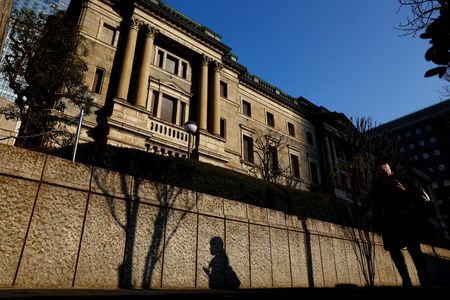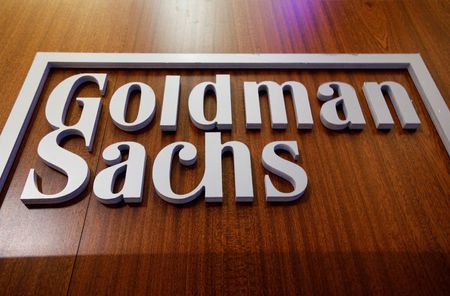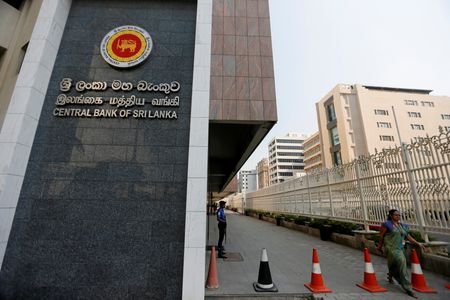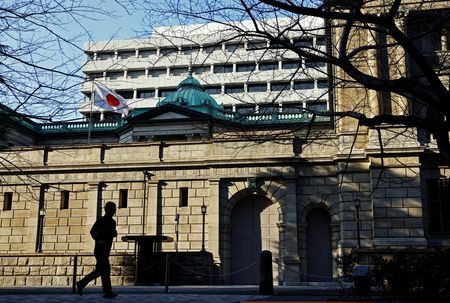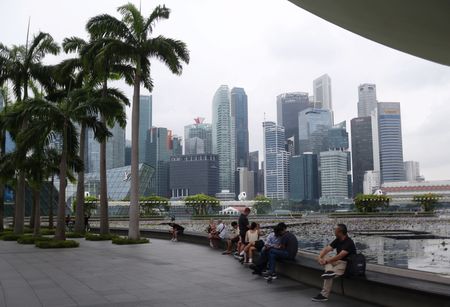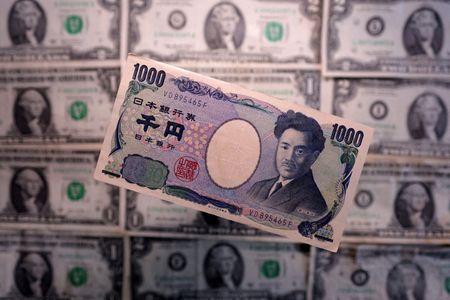By Kiyoshi Takenaka
TOKYO (Reuters) – Nearly two-thirds of Japanese firms want the Bank of Japan to temporarily pause interest rate hikes as U.S. President Donald Trump’s tariff policies raise pressure on earnings, a Reuters poll showed on Thursday.
Japan’s economy contracted for the first time in a year in the first quarter, underscoring the fragile nature of its recovery now under threat from U.S. trade policies.
About 65% of respondents want the BOJ to pause interest rate increases and 10% would like to see rates lowered, while 25% are of the view that the central bank should proceed with rate hikes, the survey showed.
“No one knows how negotiations over the Trump tariffs will be settled and what their impact will be. Any rate action should be taken only after visibility has been regained,” a manager at a company in the service sector wrote in the survey.
An official at an electronics company said the tariffs on Japanese goods, coupled with a firmer yen on the back of higher interest rates, would be a “double whammy” for the nation’s all-important export-oriented industries.
The survey was conducted by Nikkei Research for Reuters from May 7-16. Nikkei Research reached out to 504 companies and 224 responded on condition of anonymity.
On April 2, Trump imposed 10% tariffs on all countries except Canada, Mexico and China, along with higher tariff rates for many big trading partners, including Japan, which faces a 24% tariff rate starting in July unless it can negotiate a deal with the United States.
Washington has also imposed 25% levies on cars, steel and aluminium, dealing a huge blow to Japan’s economy, which relies heavily on automobile exports to the United States.
Among those respondents who want the BOJ to carry on with rate increases, 42% picked the last quarter of 2025 as desirable timing for the next hike, while 36% chose July-September this year.
A separate Reuters poll showed last week that most economists expected the BOJ to hold interest rates through September as it pauses to assess the effects of the U.S. tariffs.
EARNINGS IMPACT
On U.S. tariffs’ earnings impact, 9% of respondents expect a significant negative effect and 54% anticipate a moderate adverse impact, while 34% see little unfavourable effect, the survey showed. No company expected a positive impact.
“We expect a drop in exports of cars made in Japan to the United States, and our sales to the auto industry will likely fall as well,” a manager at a chemical company said.
Asked how they would respond to the tariff-related downside risks to earnings, more than half of respondents said they planned to pass on the added costs to consumers.
However, despite the widely anticipated earnings impact of the Trump tariffs, most Japanese companies are determined to stick to their plans to raise wages amid chronic labour shortages.
About 83% of respondents intend not to let the new U.S. tariffs affect their wage hike plans, the survey showed.
“We need to raise wages regardless of U.S. policies. Otherwise, we cannot obtain human resources,” an official at a machinery maker said.
Japanese companies have agreed to raise pay by 5.32% this year, the fifth tally of annual labour talk results from the country’s largest union umbrella group, Rengo, showed this month, staying on course to deliver the biggest pay hike in 34 years.
The Reuters survey also showed nearly half of respondents saw the yen trading between 140-145 yen to the dollar in the current business year to March 2026, while 26% expected the Japanese currency to be weaker at 145 to 150 yen.
On Wednesday, the yen was trading around 144 yen to the dollar.
(Reporting by Kiyoshi Takenaka; Editing by Shri Navaratnam)

